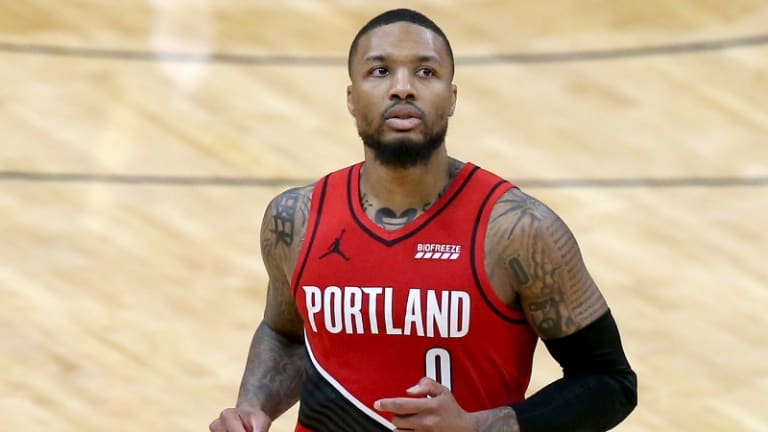
How Damian Lillard Preyed on Michael Porter Jr. in Game 1
The Trail Blazers doled out 29 assists in their convincing Game 1 win over the Denver Nuggets, the second-most they've managed in any playoff game during the Damian Lillard era.
Everyone from Lillard to Carmelo Anthony to Anfernee Simons to Terry Stotts championed Portland's commitment to the extra pass after the game, too. Stotts even singled out his team's hard-fought mid-April loss to the Boston Celtics as a turning point for the Blazers' ball movement, a game in which they had 31 assists.
Portland, last in assist rate again this season, is embracing its recent emphasis on making the extra pass at the perfect time. The Nuggets' aggressive, active defense regularly commits two defenders to the ball, relying on back-line rotations that create quick-closing passing lanes all over the floor – and the Blazers were more than ready to take advantage.
But among the biggest takeaways from Portland's Game 1 victory had little to do with passing at all, and instead the gambit of superstar ball handlers targeting weak individual defenders in pick-and-roll – ever-popular under the postseason pressure cooker.
Damian Lillard first preyed on Michael Porter Jr. after the initial timeout of the third quarter, his team suddenly down nine points on the road. The decisive ease with which Lillard drew the switch he wanted, slowed down to rev up then pulled back for three on Porter was a sign of things to come.
Portland went to the exact same play, a basic high ball screen between Lillard and Robert Covington, on the other side of the floor its next trip down.
Porter switches with Campazzo again, wary of a pull-up three. Lillard notices he's up on the ball, and attacks Porter's high foot with a right-to-left between-the-legs that goads defensive rotations and leads to a wide-open three from C.J. McCollum.
Porter's only respite from Lillard's personal attack in the third quarter was a brief stint on the bench.
Once he was back in, Lillard went right back to exploiting him – this time in flat embarrassing fashion on two more consecutive possessions.
The results of Lillard's third-quarter hunting? 11 total points courtesy of five ball screens turned isolations on Porter. The only time Lillard failed to produce points is when Porter trailed him for a recovery block at the rim, a play on which broadcast replays showed Lillard was fouled.
After the game, Michael Malone spoke candidly about his team's defensive strategy when Lillard was targeting Porter. Denver eventually went from low-resistance switching to hedging and recovering, doing its best to keep Porter out of Lillard's crosshairs – an approach Malone seems optimistic will yield better results for the Nuggets going forward.
"We did both. We switched on early and he was able to score, he was able to draw the foul on the shot fake against Michael," he said of Lillard. "But we also showed with Michael and tried to get through and kind of keep him off Lillard a few times as well. I think moving forward we'll probably do a combination of both. There will be times where we switch screens and Michael's gotta press up, stay down on shot fakes like he did, and just get really big and make him finish over your length at the rim. And then sometimes we won't just switch it and give into it, give them different looks, which I think you need to do against a great player in Damian Lillard."
Switching Porter onto Lillard, obviously, is not a winning proposition for the Nuggets. He just doesn't have the lateral quickness or hip flexibility to stay in front of Lillard, and isn't helped by lacking overall defensive instincts.
The problem for Denver is that helping and recovering didn't work much better.
Lillard doesn't need the switch to dominate. Just the head of steam an on-ball pick from McCollum provides is enough to put him in an advantage situation – in this case, the post, where he thrived all night long – against Denver's diminutive primary defenders.
Even an empty trip that begins with Lillard seeking out Porter still yielded a look the Blazers would happily take most every time down the floor.
So much attention has been paid to the bind in which Nikola Jokic's defensive limitations force Denver, and rightfully so. Most of Portland's 29 assists came at the expense of putting Jokic in pick-and-roll, dragging him to the perimeter and attacking a scrambling defense from there.
But Jokic, unfortunately, isn't his team's only indispensable offensive player who doubles as a flammable defender. Expect Lillard to prove it again and again as the first round continues, no matter how the Nuggets try and protect Porter.